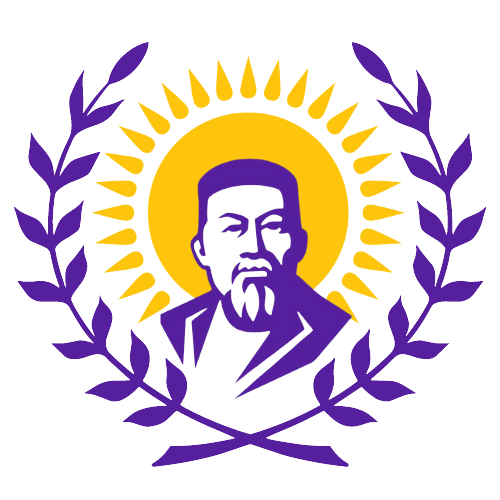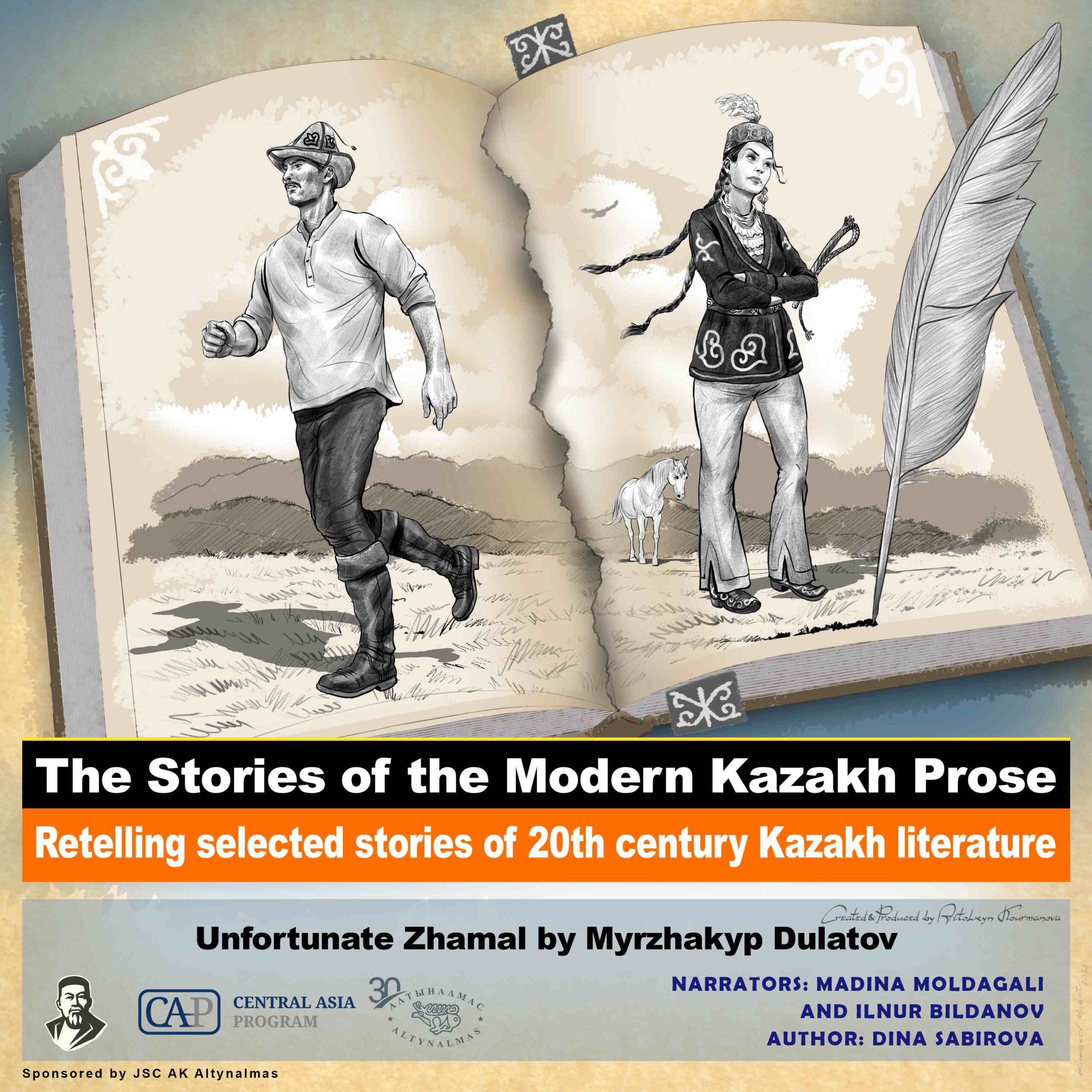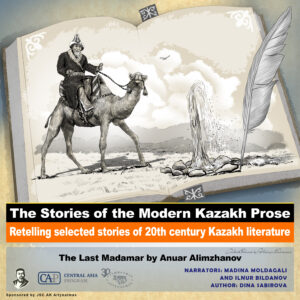
Myrzhakyp Dulatov was born on November 25, 1885. He lost his parents early. Dulatov’s political creed was clearly articulated when, in 1909, he published his first collection of poetry, Oyan, Kazak! (Wake Up, Kazakh!). The copies in circulation were immediately confiscated—and in 1911 he was arrested. Dulatov became one of the leaders of Kazakh reformism and the national liberation movement. In the summer of 1917, he helped to organize the First All-Kazakh Congress in Orenburg. He subsequently became a member of the Alash-Orda government led by Alikhan Bukeikhanov and Akhmet Baitursynov. In 1928, he was arrested by the NKVD on charges of Kazakh nationalism. On October 5, 1935, Dulatov died in a prison hospital.
FULL TEXT
Sarsenbay was a wealthy cattle breeder from a noble family. His wife, Kalampyr, could not have children, so when Sarsenbay was already over forty, with the permission of his wife and relatives, he took a second wife, Sholpan. Sholpan gave birth to a long-awaited child, a daughter named Jamal. Jamal grew up in love and freedom. She was allowed to do what she wanted; she wanted to wear boys’ clothes and play boys’ games, and her parents did not object. Jamal became angry when she was called a girl.
Once, an uneducated mullah came to the house. Talking to Jamal, he realized that under the boy’s clothes was a girl. Outraged, he began to preach to Sarsenbay that, according to Kazakh and religious traditions, his daughter should learn to pray.
Sarsenbay liked the idea of religious education at the mosque; Jamal, not so much. Some people advised the girl to get a secular education in which she would learn to read and write. A compromise was found. The young Mullah Gazis taught her the Koran, and after religious studies taught Jamal to read and write.
Soon, the family shared more good news: Sarsenbay’s second wife, Sholpan, had also given birth to a son. Meanwhile, learning came easily to Jamal: having learned to read and write, she began to read traditional Kazakh works with enthusiasm. Her chest was full of books (at that time, books in Kazakh were published in Kazan and Orenburg). At the request of her father and other elders, she would read interesting books to guests and her fellow villagers. Everyone loved to listen to her. She had read a lot of fiction and knew many passages by heart.
Hearing about her extraordinary abilities, the wealthy and powerful Baizhan decided to marry his rather unremarkable and slow-minded son to Jamal. He sent matchmakers to Sarsenbay, who—as his wealth and respect grew—wanted to participate in local politics and become elected to a position at the local level. Fearing the influence of Baizhan’s family, poor Sarsenbay agreed to marry Jamal to Baizhan’s son Zhuman. There were rumors of Zhuman’s stupidity, but Sarsenbay agreed to their marriage anyway.
Jamal was unhappy with this choice. She felt no love for Zhuman and did not believe he was a good match for her. She directed all her bitterness, pain, and pangs of disappointment toward her father, despite understanding that her father was trapped in a labyrinth of complex relationships that made him dependent on power.
In her sadness, Jamal wrote a poem about the poor situation of girls in the steppe and inequality. She hid her poem in the chest with her books, but her mother accidentally opened the chest and found the poem in which her daughter lamented her unfortunate fate. Sympathizing with her, Sholpan reproached her husband for having decided, for such base motives, to marry off her daughter to a fool who would not love her.
Sarsenbay responded, “Baizhan will deal harshly with us if we decide to marry her off to someone else, because he is strong and influential. It’s too late anyway, which means that this was her fate.”
Jamal was sad, but she did not want anyone to see her feelings and gossip about her. So she kept attending gatherings of her friends, where she met a handsome young man, Gali. He was not rich, but he had been educated at a madrasah and was engaged in trade. People said that Gali was a lively guy who studied and did business.
Gali was Jamal’s equal in intelligence, upbringing, and talent. They became very close; they could talk for hours about everything: culture, injustice. Most importantly, they understood each other. It was clear that they liked each other. But the young people could not confess their love to each other.
Then the news came that in a month Baizhan and his son Zhuman would come for the bride. This sad news made the young people confess their innermost feelings to each other. Gali, after consulting with his childhood friends Zhunus and Nurmash, made the risky decision to steal Jamal.
Jamal shared these plans with her mother, who had never liked the idea of marrying her off to the stupid Zhuman. Jamal and Gali set the date; Gali began preparations and found the horses. On the appointed day, Jamal showed up at the agreed place with her mother, who saw them off.
After escorting the couple to a safe place, the friends left them. Jamal and Gali reached Bay Fatihkholla. He agreed to host them.
In the morning, Sarsenbay discovered the loss of his daughter. He secretly sent a message to Baizhan about the disappearance of Jamal, in which he asked, “What do we do next?”
Bayzhan rained insults on Gali’s friends. Then he began to threaten them. Zhunus and Nurmash were told that if they did not find the girl within a month, they would be sent to prison.
Learning about the mood of the wealthy bay, Fatihkholla feared for the young couple and for himself. Jamal and Gali understood his hints and set off for another place. They thought they would go to Gali’s relatives and stay with them for a while.
But on the way, Gali fell seriously ill. On the fourteenth day of sickness, he died. Poor Jamal was heartbroken. Her parents came to collect her. She was allowed to see Gali’s grave, where she wept bitterly.
“Gali! Gali! Your unfortunate Jamal has come to see you. It would have been better if the Almighty had taken me instead of you, but not a single soul can oppose his will. It was arrogant of me to say that my life would be carefree and happy, and that I would be protected from all troubles, because I have Gali! But the Almighty did not listen to my prayers! Gali, I’ve lost hope. You came out of the crimson fire and set off on a long journey—may it be good for you! I will not forget you as long as my soul lives in my dreary heart. No gold can match my love for you. Farewell, my dear! Gali! Because of me, you could not even see your kind parents, you could not bring them to the path to the Almighty—forgive me, my dear! May God grant that we may be together in the afterlife; only then will all the suffering that I experience be forgotten. I can’t find my place in this mortal world without you, my dear. Goodbye… now…,” said Jamal, fainting.
Upon her return, Jamal was beside herself with grief. But it was decided to marry her off to Zhuman nevertheless.
After the wedding, Zhuman began to beat her severely. No one stopped him or stood up for the unfortunate Jamal. Several months passed. Jamal could not stop thinking about the city and escaping. But when she finally decided to run away, she got lost in bad weather.
“Gali, Gali, my soul suffers, where are you?” These were the final words uttered by the beautiful Jamal, who had once been loved by everyone but could not achieve her goal and died in the steppe on a merciless, stormy December night…
In the novel Unfortunate Jamal, Myrzhakyp Dulatov conceived an unusually complex and interesting female character. Beautiful in appearance, Zhamal is at the same time wayward, proud, resolute—just like the strong female characters of Kazakh epics. At the same time, her behavior and actions, her thoughts and feelings, her relationships with others, her aspirations, and her tragic fate are shaped in many ways by the changes in the life of Kazakh auls that occurred during the early twentieth century. An interesting social background can be seen: the aul, its structure and way of life, the election of volost governors and of people’s judges, politics and passions. But Dulatov’s main achievement is the creation of a female character who lives in anticipation of happiness, seeks something unusual in her life, is amazed by her own talents and abilities, and feels that the changes to her surroundings will bring about changes in her life. Alas, woman’s liberation occurred neither in the early twentieth century nor later.




